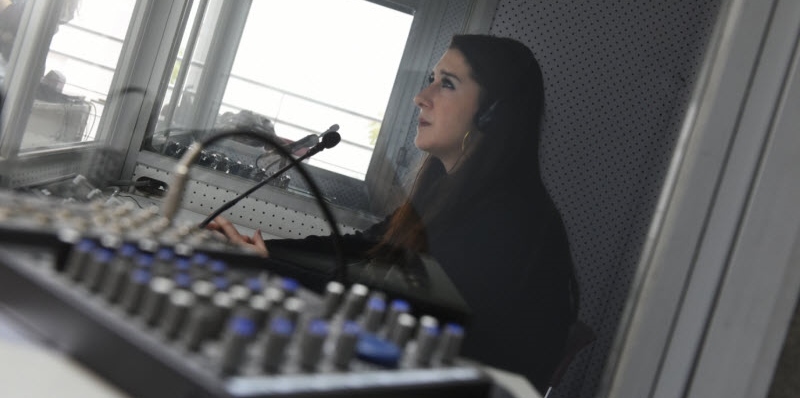The M.A. in Conference Interpreting provides you with a solid grounding in Interpretation Theory and over 300 hours of hands-on training inbound and outbound interpreting. Roughly 50% of your training is done in our Interpreting Lab using interpreting booths.

Strengths of the MACI Program
The M.A. in Conference Interpreting reflects the way conference interpretating is practiced today. It is taught by faculty with extensive experience as professional interpreters providing services to national and international organizations and events. Furthermore, the program is in alignment with the training requirements set by the Directorate General for Interpretation (SCIC) of the European Commission. Program strengths include the following:
- Practice on a wide range of material such as speeches, presentations and webinars on a rich variety of topics, including EU, international politics, business, law, and medicine.
- Over 300 hours of interpreting practice in situ (interpreting booth environment) and online (remote interpreting).
- Direct links with the interpreting industry through participation in conferences, congresses and seminars as auditors as well as practitioners.
- Faculty mentoring and personal support for your academic and professional development.
- Career counseling and networking opportunities through the Career Development Office during and after your studies.
- Cooperation with the Terminology Coordination Unit of the European Parliament on terminology projects.
 Cooperation with the Model European Union Strasbourg (MEUS) project, an immersive, inclusive and engaging simulation of the European Union legislative process. Conference interpreting students from different European universities are eligible to offer pro bono interpreting services during the event.
Cooperation with the Model European Union Strasbourg (MEUS) project, an immersive, inclusive and engaging simulation of the European Union legislative process. Conference interpreting students from different European universities are eligible to offer pro bono interpreting services during the event.
MACI Career Paths
The program's structure and content are fully tailored to meet the needs of aspiring interpreters who wish to pursue a career in national and European institutions and public services. Also, as a graduate of the MACI program you can pursue an interpreting career with media organizations and agencies specializing in conference organization. You can also participate in all EU calls for conference interpreting personnel (through EPSO).
More about the MACI Program
Program Structure
You will need to complete a total of 10 courses plus a Thesis to earn the Master of Arts in Conference Interpreting [MACI]. The duration of the program is 12 months. An academic year includes two semesters, each semester running for 15 weeks. Successful completion of the program will require a total of 33 credits / 10 courses and 1 thesis (3 credits). Consult the Hellenic American University website for a detailed list and description of courses in the degree program.

Things You’ll Learn
Upon completion of your MA in Conference Interpreting degree studies you should be able to interpret accurately and precisely speeches, texts and abstracts in and out of your native language in a variety of professional settings and scientific and technical domains. You will develop essential skills including:
- Sight Translation, Liaison, Consecutive, Remote & Simultaneous Interpreting
- Critical thinking
- Summarizing for interpretation
- Intercultural communication
- Identifying key linguistic resources needed for specialized interpreting assignments such as medical, legal and technical conferences
MACI Research & Hands-On learning
During your studies for the MACI you will have the opportunity to engage in peer research projects under the supervision of our faculty and participate as working interpreters in simulated conferences. You will also develop your language fluency and decision-making through interpreting assignments and special language-enhancement master classes. Finally, you will receive extensive training in all Conference Interpreting modes including sight translation, community, consecutive and simultaneous interpreting in and out of your native language.
Admissions Requirements
In addition to the required documents for admission, candidates who are applying for the Master of Arts in Conference Interpreting (MACI) programs must also submit the following:
Evidence of Second Foreign Language or Greek Language Proficiency; this can include:
- An undergraduate or graduate degree from an institution in which the second foreign language is the language of instruction
- Equivalent certificate of proficiency for the second foreign language (if involved)
- Equivalent certificate of proficiency for the Greek language (for non-Greek citizens)
- Other evidence of proficiency will be reviewed individually
Applicants to the MACI Program also need to take an oral test conducted by interpreters and interpreting instructors. In this test the candidate will be asked to do a sight translation, that is, to read a text from the source language simultaneously into the target language.
What students and graduates say about the program
As a qualified translator but self-taught public-sector interpreter working with law enforcement, I decided to attend the MACI to learn the interpreting methods and techniques that would allow me to become more effective in my work. The program fully met my expectations. It prepared me well for work in formal settings such as high-level international meetings and conferences. And it was taught by a team of highly qualified instructors, all of them professional interpreters, who not only conveyed their knowledge but also instilled in us a strong sense of discipline, self-confidence, and professionalism. I strongly recommend it.
1 of 1
